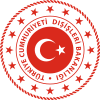Deniz Baykal
Deniz Baykal | |
|---|---|
Minister of Finance | |
| In office 26 January 1974 – 17 November 1974 | |
| Prime Minister | Bülent Ecevit |
| Preceded by | Sadık Tekin Müftüoğlu |
| Succeeded by | Bedri Gürsoy |
| Member of the Grand National Assembly | |
| In office 14 November 2002 – 11 February 2023 | |
| Constituency | Antalya (2002, 2007, 2011, June 2015, Nov 2015, 2018) |
| In office 14 December 1987 – 18 April 1999 | |
| Constituency | Antalya (1987, 1991, 1995) |
| In office 14 October 1973 – 12 September 1980 | |
| Constituency | Antalya (1973, 1977) |
| Personal details | |
| Born | 20 July 1938 (1985–1992) |
| Spouse |
Olcay Baykal (m. 1963) |
| Children | 2 |
Deniz Baykal (20 July 1938 – 11 February 2023) was a Turkish politician. A member of the Republican People's Party (CHP) who served as Deputy Prime Minister and Minister of Foreign Affairs from 1995 to 1996. Having served in numerous government positions, Baykal led the CHP from 1992 to February 1995, from September 1995 to 1999 and again from 2000 to 2010. Between 2002 and 2010, he also served as the Leader of the Opposition by virtue of leading the second largest party in the Parliament.
First elected to Parliament in
Baykal was one of the leading members of the re-established CHP, which was founded again in 1992. He served as the party's leader until 1995, when the CHP and SHP merged during a convention. He was re-elected leader in September 1995, after which Baykal contested the
As the oldest MP in Parliament following the
Early years
Baykal was born to Hüseyin Hilmi and Feride in
Political career before 1980
Early career
Baykal first became involved in politics during the 1950s, having taken part in student movements opposing the
Minister of Finance, 1974
In the short-lived
Minister of Energy and Natural Resources, 1978-79
Baykal became the
At the same time as serving as Energy and Natural Resources Minister, Baykal was also elected to the CHP Party Council and served as both a Central Executive Committee member and a deputy Secretary General of the party. In the party convention held after the disappointing 1979 senate and by-elections, he was heavily critical of the party's established executive.
1980 coup d'état
Like many politicians of the 1970s, Baykal was arrested and detained in
Political career after 1980
SHP era, 1987
SODEP merged with the
During this period, he served as the co-president of the Turkey-European Union inter-parliamentary committee and was a member of the parliamentary foreign policy committee.
Re-establishment of the CHP, 1992
In 1992, with the abandonment of laws prohibiting the re-foundation of former political parties, he led a significant movement and re-established the historical Republican People's Party (CHP), which had been closed down by 1980 military regime. He was elected as the leader of the party.
The CHP had entered the 1994 local elections with the political left split between the CHP, SHP and the Democratic Left Party (DSP) of Bülent Ecevit. In a party convention held in February 1995, the CHP formally merged with the SHP, while the DSP refused to consider a merger. Baykal did not stand for the leadership in this convention, with Hikmet Çetin being elected leader of the newly enlarged CHP instead.
Coalition government era
Baykal was re-elected as leader of the CHP during a convention in September 1995. He formed a
Despite their poor election performance, Baykal was reelected as leader during the CHP convention of 27 February 1998. In the
Leader of the Opposition, 2002–2010


Baykal led the CHP through the 2002 general election, where the party won 19.38% of the vote and came second. The newly formed Justice and Development Party (AKP), meanwhile, won a landslide majority in Parliament and put an end to years of unstable coalition governments. Baykal subsequently became the leader of the opposition, leading the only opposition party in Parliament. All other parties had fallen short of the 10% boundary, leaving the AKP with 363 and the CHP with 178 seats in the 550-seat Grand National Assembly.
Baykal was instrumental in assisting the AKP change the law in order to allow the party's banned leader, Recep Tayyip Erdoğan, to enter Parliament. Erdoğan had been banned from public office due to religious intolerance, with the AKP needing 367 votes in Parliament to change the law in Erdoğan's favour. The CHP supported the change and Erdoğan was elected to Parliament in a by-election in 2003, subsequently taking over from Abdullah Gül as Prime Minister.
Baykal has always held his ground as a staunch supporter of a strong response to terrorism.[2]
Leading his party through the
Baykal strongly protested the AKP's nomination of Abdullah Gül as their presidential candidate for the
Baykal joined forces in an electoral alliance with the DSP in time for the
The CHP's moderate vote share increase continued through the
He resigned from the leadership of CHP on 10 May 2010. This was due to criticism of his private life after an alleged video-tape showing him in the same bedroom with his former secretary, and a member of parliament Nesrin Baytok, was leaked to the media.
Political activities since 2010
Baykal was re-elected as an MP in the
Baykal was one of the five CHP politicians who were offered ministerial positions by
Re-elected as an MP in the November 2015 general election, Baykal was once again the oldest MP in the newly elected 26th Parliament of Turkey and subsequently became interim Speaker of the Parliament on 17 November 2015. He was succeeded by İsmail Kahraman, the AKP's candidate for Speaker, who was elected on 22 November 2015 in the third round. The CHP's candidate this time round had been Ayşe Gülsün Bilgehan, the granddaughter of former President İsmet İnönü.
Personal life and death
Baykal died on 11 February 2023, at the age of 84.
See also
- 37th government of Turkey
- 42nd government of Turkey
- 52nd government of Turkey
- Left of Center (Turkey)
- List of members of the Grand National Assembly of Turkey who died in office
References
- ^ "Deniz Baykal bakanlık teklifine 'tarihi' yanıtı". 27 August 2015.
- ^ "Baykal: Terörle Mücadelede Kararlı Olunmalı". turktime.com. Archived from the original on 13 June 2015. Retrieved 11 June 2015.
- ^ "SABAH - 29/01/2005 - Olaylı Kurultay".
- ^ Guzeldere, Ekrem Eddy (22 June 2009). "Turkey: regional elections and the Kurdish question". Caucasian Review of International Affairs. 3 (3): 291–307.
- ^ "Turkey's opposition: Sex, lies and video". The Economist. 13 May 2010.
- ^ "AK Party candidate İsmet Yılmaz becomes Turkey's new Parliament Speaker". Daily Sabah. July 2015.
- ^ "İşte Bakanlık teklifini reddeden isimler". MİLLİYET HABER - TÜRKİYE'NİN HABER SİTESİ. 26 August 2015.
- ^ "Deniz Baykal HABERTÜRK'e konuştu: Cevabımın sorulmasını bile hakaret sayarım". 26 August 2015.
- ^ "CHP eski Genel Başkanı Deniz Baykal vefat etti" (in Turkish). Milliyet. 11 February 2023. Retrieved 11 February 2023.
- ^ "SON DAKİKA: CHP Eski Genel Başkanı Deniz Baykal vefat etti! Cenaze programı detayları belli oldu - Deniz Baykal neden öldü?" (in Turkish). Sabah. 11 February 2023. Retrieved 11 February 2023.
- ^ "Deniz Baykal hayatını kaybetti" (in Turkish). Sözcü. 11 February 2023. Retrieved 11 February 2023.
- ^ "Deniz Baykal son yolculuğuna uğurlandı" (in Turkish). Dunya.com. 14 February 2023. Retrieved 18 February 2023.
External links
 Media related to Deniz Baykal at Wikimedia Commons
Media related to Deniz Baykal at Wikimedia Commons




